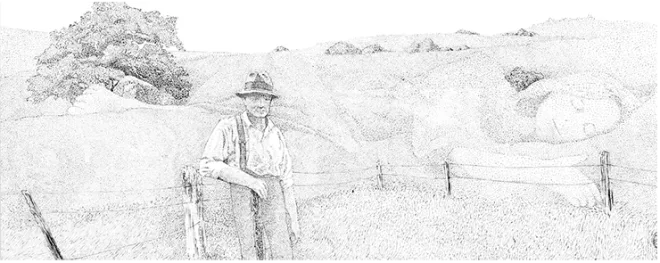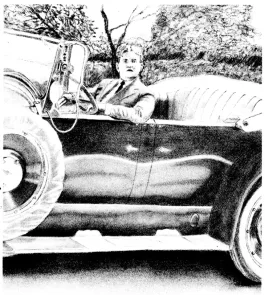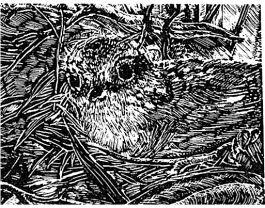
I’ve run over 1,000 stories in GreenPrints’s 28-1/2 years. A very small number are immortalized in my mind. One of my all-time favorites is “My Ninety Acres,” from farmer/conservationist Louis Bromfield’s 1943 Pleasant Valley, “a book written in the profound belief that farming is the most honorable of professions and unquestionably a romantic one.”
Yet if you weren’t a GP subscriber way back with Issue No. 5—March, 1991!—you’ve probably never had the chance to cherish this unforgettable agricultural love story. Readers, you do now.
I had a friend, a little old man, who lived over the hill in Pos-sum Run Valley in a small white house on a farm which is known as “My Ninety Acres.” It has never been given that name as farms are named “Long View” or “Shady Grove.” Old Walter Oakes had earned the right to say “ My Ninety Acres “ as Augustus Caesar might say “My Empire.”
He had a right to speak of it with pride. It wasn’t the conventional Currier and Ives farm one expects from the long tradition of American farming—a bright, new place, with new wire fences, and cattle standing like wooden animals in a pasture that was more like a lawn than a pasture. There was a certain shagginess about it.
The patches of lawn were kept neatly mowed, but surround-ing them grew a jungle of old-fashioned flowers and shrubs—lilacs, standing honeysuckle, syringa, bleeding heart, iris, peonies, tiger lilies, day lilies, old-fashioned roses like the Seven Sisters and the piebald and the Baltimore Belle. At the back, the little vegetable garden was neat enough with its rows of vegetables and its peach and pear and quince trees in a row inside the white picket fence. But beyond the borders of the garden, the shagginess continued. There weren’t any bright, new, clean wire fences. The wire along the fence rows was hidden beneath sassafras and elderberry and wild black raspberry, and the wood lot on the hill above the creek was not a clean place with the grass eaten short by cattle. The cattle had been fenced out and the trees, from seedlings to great oaks, grew rankly with a tropical luxuriance.
But despite the shagginess of the farm’s appearance, no fields in the Valley produced such big crops or pastured such fine cattle and hogs. At “My Ninety Acres” the shagginess didn’t exist, the neighbors came to understand, because Walter was lazy or a bad farmer—there was no more hard-working man in the whole Valley. They were that way because Walter wanted them like that—Walter and Nellie.
I never saw Nellie Oakes. I am 48 years old and Nellie died before I was born when she gave birth to her second son, Robert. But my father told me about her. In his time she had been the most beautiful girl in the Valley and she taught school at the Zion school house until, when she was 22, she married Walter Oakes. I think Nellie was beautiful rather than pretty because of her look of intelligence.
People in the Valley couldn’t see why Walter Oakes didn’t get married again. They said, “He’s still a young man and he’s done a wonderful job with ‘My Ninety Acres,’” or “I don’t see how a man like that can get on without a woman at his age. It ain’t natural.” And a good many widows and spinsters past their first youth certainly set their caps for him. It wasn’t only that he was doing well with “My Ninety Acres.” He was, as I remember him then, a big, straight, clean, good-looking fellow with his suntanned face, blue eyes, and blonde hair bleached by the sun. He would, I think, have pleased even a young girl.
But Walter never showed any signs of marrying again. He was always polite and his eyes sometimes twinkled with humor when he saw what some of the good ladies were up to.
With all my family, I went away from the county when I was 17 and I was gone for 25 years. In the first weeks after I came home, I never thought about my father’s friend, old Walter Oakes. And then one day I heard Wayne, one of the boys on the farm, say something about “My Ninety Acres” and I remembered it all and asked, “Is Walter Oakes still alive?”
“Alive!” said Wayne, “I’ll say he’s alive. The livest old man in the county. You ought to see that place. Brother, that’s the kind of farm I’d like to own. He raises as much on it as most fellows raise on five times that much land.”
The next Sunday I walked over the hills to “My Ninety Acres.” The corn stood waist-high and vigorous and green, the oats thick and strong, the wheat already turning a golden yellow. In the meadow, the bumble-bees were working on clover that rose almost as high as a man’s thighs. In all that plenty there was something almost extravagant and voluptuous.
By now, of course, I remembered enough to know that I should find old Walter somewhere in the fields. Sunday afternoon he always spent walking over the place.
So I went down toward the creek and as I turned the corner by the barnyard, I saw him down low moving along a fence row. Two sheep dogs were with him, the great-great-great grandchildren of the pair I had known as a boy. He was still tall and strong, although he must have been over 70, and only a little stooped. He stood thus until I was quite near him, and then I saw a twinkle come into the bright blue eyes.
“I know,” he said, holding out his hand. “You’re Charlie Bromfield’s boy. I heard you’d come back.” A faint change of color came into his face and he said shyly, “I was just snooping around My Ninety Acres. I like to see what goes on here and I don’t get time during the week.”
Then he said, “Come with me and I’ll show you something.”
I followed him along the fence row and presently he knelt and parted the bushes and beckoned to me. I knelt beside him and he pointed. “Look!” he said, and his voice grew suddenly warm, “Look at the little devils.”

I looked and could see nothing at all but dried brown leaves with a few delicate fern fronds rustling through them. Old Walter chuckled and said, “Can’t see ’em, can you? Look, over there by that hole in the stump.” I looked and then slowly I saw what he was point-ing at. They sat in a little circle in a tiny nest, none of them much bigger than the end of one of old Walter’s big thumbs—seven tiny quail. They sat very still not moving a feather, lost among the dry, brown leaves. I might not have seen them at all but for the brightness of their little eyes.
“Smart!” he said, with the same note of tenderness in his voice. “They know! They don’t move!”
Old Walter stood up and said, “They used to laugh at me for letting the bushes grow up in my fence rows, but they don’t any-more. When the chinch bugs come along all ready to eat my corn, these little fellows will take care of ’em.” He chuckled, “There’s nothing a quail likes as much as a chinch bug. Last year Henry Talbot, down the road, lost ten acres of corn all taken by the bugs. Henry’s a nut for clear fence rows. He doesn’t leave enough cover along ’em for a grasshopper. He thinks that’s good farming, the old fool!” The old man chuckled again.
We were walking now up the slope from the creek toward the house, and he went on talking. “That fence row beside you is just full of birds—quail and song sparrows and thrushes—the farmer’s best protection. It was Nellie that had that idea about letting fence rows grow up. I didn’t believe her at first. I was just as dumb as most other farmers. But I always found out that Nellie was right about farming. She was hardly ever wrong…I guess never.”
It wasn’t the last time I saw old Walter. The Sunday afternoon visits to “My Ninety Acres” became very nearly a habit, for I found gradually that old Walter was in himself an education. He knew more of the fundamentals of soil, of crops, of livestock than any man I have ever known. Some of them he had read in books and in farm papers, but instinctively and out of experience, he rejected things which ran counter to the laws of nature.
“Nellie,” he would say, “always said that nature and the land itself was the best answer to all these questions. If it wasn’t natural it wasn’t right, Nellie would say, and I’ve never found that she was wrong. She used to say that there were two kinds of farms—the “live” farms and the “dead” ones and you could tell the difference by looking at them. A “live” farm was the most beautiful place in the world and a “dead” farm was the saddest. It depended on the man who worked them—whether he loved the place and saw what was going on or whether he just went on pushing implements through the ground to make money.”
And then one brilliant day in October, I saw a big, shiny black car coming up the long lane to our house. I knew at once who was in it. I went down the path to meet him. He said, “I’m Robert Oakes. My father told me you had come back to live in the Valley.”
“Yes, I know. I am delighted to see you. Come in.”
I found him rather as I had expected him to be, an intelligent fellow, with a good deal of dignity and authority. After lunch we sat for a time on the porch overlooking the Valley. And presently he came around to what was clearly the object of his visit. “I really wanted to talk about my father,” he said. “He’s quite a problem and stubborn as a mule. I thought you might have some influence with him. You see, I offered him almost everything—I have offered him a fruit ranch in Florida or Southern California, or a bigger farm, or a flat in New York. I’ve tried everything and he doesn’t want any of it. He won’t even let me hire him a couple or buy him an automobile or any machinery that might make life easier for him. I want you to persuade him to let me do something for him. He’s 75 years old and I’m afraid something will happen to him alone there in the house or barn.”
“I’m afraid it’s no good,” I said. “I couldn’t persuade him any more than you.”
We were both silent for a time and then I said, “Honestly, Bob, I don’t think there’s anything to be done, and to tell the truth I don’t see why we should do anything. He’s as happy as it’s possible for a man to be. He’s tough as nails and he loves that place like a woman.” Then hesitantly, I said, “Besides, Nellie is always there looking after him.”
A startled look came into the son’s blue eyes and after a moment he asked, “Do you feel that way, too?”
I said, “I think Nellie is everywhere in that ninety acres. He’s never lonely. She’s in the garden and the fields and his famous fence rows. She’s out husking corn with him now in the bottom forty.”
Robert lighted another cigar. “It’s the damnedest thing,” he said. “Sometimes I think the old gentleman gets Nellie and the ninety acres a little mixed up.”
I continued to go over every Sunday, and each time I went over I learned something about soil or crops or animals, for the knowledge and experience of the old man seemed inexhaustible. And then one Sunday afternoon in early September when we were walking alone through one of old Walter’s corn fields, I made a discovery. It was fine corn, the whole field, the best in the whole county, and as we came near the end of a long row, he stopped before a mighty single stock of corn which was beautiful in the special way that only corn can be beautiful. It was dark green and vigorous and from it hung two huge, nearly ripened ears and a third smaller one. Old Walter stopped and regarded it with a glowing look in his blue eyes.
“Look at that,” he said. “Ain’t it beautiful? That’s your hybrid stuff.” His hands ran over the stalk, the leaves and the ears. “I wish Nellie could have seen this hybrid corn. She wouldn’t have believed it.”
As I watched the big work-worn hand caressing that stalk of corn, I understood suddenly the whole story of Walter and Nellie and the ninety acres. Walter was old now, but he was vigorous and the rough hand that caressed that corn was the hand of a passionate lover. It was a hand that had caressed the body of a woman who had been loved as few women have ever been loved, so passionately and deeply and tenderly that there would never be another woman who could take her place. I felt again a sudden lump in my throat, for I knew that I had understood suddenly, forty years after the woman was dead, one of the most tragic but beautiful of all love stories. I knew now what Robert’s strange remark about Nellie and the ninety acres getting mixed up had meant. Robert himself must once have seen something very like what I had just seen.
It happened at last. I went over one Sunday afternoon a few weeks later and when I could not find old Walter or the dogs anywhere I returned to the house and went inside. I called his name but no one answered, and in a little while I heard scratching and whining in the ground floor bedroom and then a short bark, and when I opened the door, the sheep dog bitch came toward me. The other dog lay on the hooked rug beside the bed, his head between his paws, looking at me mournfully as if he knew that I understood. On the bed lay old Walter. He had died quietly while he was asleep.

He was buried beside Nellie in the valley churchyard. The dogs came over to join my dogs and after a while they got on together. Robert wouldn’t sell “My Ninety Acres,” but I undertook to farm it for him and one of our men went there to live. But it will never be farmed as old Walter farmed it. There isn’t anybody who will ever farm that earth again as if it were the only woman he ever loved. ❖
From the book Pleasant Valley by Louis Bromfield. Copyright ©1943, 1944, 1945 by Louis Bromfield. Reprinted by permission of Harper Collins Publishers.



